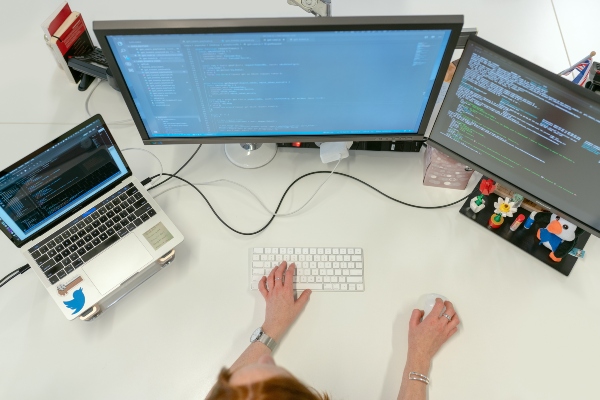Linux is an operating system that may not be particularly well recognised by the general population, but in the coding and programming world is one of the most popular systems to run computers and devices on. It’s also an operating system that has a huge amount of potential when it comes to customisation, which is why plenty of companies that design and develop their own software or applications are interested in programmers that can utilise this potential.
The role of Linux developer is particularly sought after in the electronics and embedded systems industry, as many embedded systems run on Linux and therefore need designing and maintenance by programmers comfortable with the operating system. In this article, we explain the role of a Linux developer, the typical career path and some of the key skills you’ll need to succeed in this job.

What is a Linux Developer?
A Linux developer is a kind of computer programmer that specialises in using and developing code in a Linux operating system. They use a general understanding of programming and development to create computer programs for devices that use Linux systems and often work with other programmers or software engineers on projects building new applications.
What is Linux Programming?
Linux is an open-source operating system kernel that contains a family of different operating systems. The kernel was first released in 1991 and is now the best-known open-source operating system for programmers and developers to use, mainly due to its potential for customisation.
Linux programming is any kind of software development or code writing for a program or application that is going to run on a Linux device. It tends to be used to create desktop features, real-time programs and software that runs on embedded systems.
What Does a Linux Developer Do?
Linux developers are employed by a wide range of businesses to take part in a variety of projects, from designing new applications that can be marketed to other companies to simply building a unique series of desktop applications to suit the work that is required. Specific role responsibilities will vary depending on the industry, the position and the level of experience, but in general, a Linux developer will be involved with the following tasks.
- Receiving new product briefs and brainstorming ideas to meet requirements
- Creating new computer software for Linux operating systems, including programs and applications
- Debugging Linux programs throughout the development process to ensure the final product is fault-free
- Troubleshooting any issues that arise with Linux programs they have developed after they have been launched
- Creating documentation outlining the development process for new Linux software or applications
- Designing user guides for new Linux programs
- Assessing and improving existing Linux software to ensure the best possible user experience
- Customising the Linux operating system to create a desktop environment that allows for optimum working
- Responding to changing program requirements and adapting existing Linux software
- Staying up-to-date with the latest versions of Linux operating systems and developments among Linux programmers
- Working alongside other software developers and programmers to write code and develop new features and applications for Linux devices

Linux Developer Career Path
Linux programming is not a skill that requires years of specialist training and is instead something that anyone with a background in software development or coding can come into with the right amount of experience. However, the chances of a successful career as a Linux developer are high if you start gaining the relevant skills and knowledge when you are in school, making education choices that will make you as employable as possible.
Becoming a Linux developer requires a high level of competence with computers, so it can be a good idea to start studying relevant subjects whilst you are in school. Choosing IT or computer science at GCSE level will start to give you the foundations for a career in programming, especially if you aim for the highest grade in these qualifications.
Studying IT or computer science at A Level or equivalent is also important if you’re planning on taking your studies to a degree level. You may also benefit from studying a subject such as maths or physics alongside this, which demonstrates to prospective universities that you have a practical and analytical approach to work.
The majority of Linux developers have a university degree in a subject such as computer science or information technology, although studying software engineering at university will also give you plenty of relevant skills. It is not necessary to study a 4-year MSc, although some employers may look more favourably on candidates with a Master’s degree, as starting to gain experience in Linux software development as soon as you graduate is more important in terms of your career advancement.
Studying a degree related to programming will give you a basic understanding of the concepts and technology involved in software and application development, but gaming Linux-specific skills may require independent study. Many talented candidates pursue coding projects in their free time or learn additional skills through things like a Linux developer course, becoming more comfortable with different operating systems and programming languages.
The most useful experience for a career in Linux programming is working in a role that allows you to become familiar with the operating system and write code or develop programs for it. Most entry-level positions won’t be Linux-specific, but you should look for opportunities that will start to help you hone your skills.
As previously mentioned, Linux developers can work across a range of industries with a variety of employers, so if there’s a specific sector you’d like to work in then you should also tailor your job search for this.
By working on projects involving Linux software and continuing to hone your skills outside of your job, you should build up the experience to start applying for specific Linux programmer jobs early in your career. After this, you can start to specialise in the kind of projects you enjoy the most or try working in different industries if you’re looking for more variety.
Linux Developer Salary
Linux developers are quite a sought after role in plenty of industries, which means that the salaries for programmers with these skills can be very high.
According to data from Glassdoor, the average annual salary for a Linux developer in the UK is £47,000. Candidates coming into the role in an entry-level position may only earn around £23,000 to begin with in a more general programming role, whilst candidates that are particularly successful in their careers can earn up to £94,000 each year.
The Best Linux Developer Skills
As well as relevant experience and appropriate education, potential employers will be looking for Linux developer candidates that have certain skills which make them more suitable for the role. Here are some of the best soft skills and technical skills that will benefit you on your career path.
C Programming
Whilst Linux is an operating system that is compatible with several programming languages, C is the most widely used and many think is the easiest language to code in for the operating system. If you want to apply for Linux developer jobs then being comfortable coding in C will be a huge advantage.
The majority of software developer or computer science degrees will teach you the basics of C, but you may also benefit from doing additional training courses in your free time and working on individual projects coding in C to demonstrate your capabilities.
Linux Kernel
The Linux Kernel is the name of the program that all Linux operating systems are based around. There are a range of different Linux OSs that are regularly updated or released for different uses, so if you’re going to work exclusively with this operating system then you need to be familiar with its core program, how it works and how you can adapt it.
It can be really useful to demonstrate competence in designing programs for different Linux operating systems, as this shows that you can apply your skills to a range of different scenarios and tasks.
Systems Administration and Architecture
As a Linux developer, it can also be very useful to have some experience or at least a good understanding of systems administration and architecture. This will help you to design Linux programs that are more compatible with existing operating systems and better adapt these operating systems to improve them, as well as understand the architecture behind them.
Embedded Systems
One of the key things that Linux operating systems are used for is running embedded systems devices. Whilst not all Linux developers will require an understanding of how these systems work and their purpose, embedded systems is an area of engineering that is continuing to grow, so it can be very beneficial for your career to ensure that you’re confident programming for these kinds of devices.
Problem Solving
Problem-solving is a soft skill that is incredibly important in all kinds of programming roles. As a Linux developer, you’ll have to design and refine different programmes and pieces of software as part of your role, which will certainly involve identifying issues or bugs and then removing them. This will involve a lot of problem-solving, as you’ll need to find out what is causing the problem, figure out how to fix it and also ensure that the same issue doesn’t happen again.
Teamwork
Linux developers often work in a team of other programmers and engineers, unless they’re self-employed or working in a contract role. Whilst a fair amount of the role will probably involve writing, testing or fixing code by yourself, you’ll also need to be able to work well as part of a team to develop new ideas, solve problems and present finished products.
Creativity
Linux operating systems offer a huge amount of potential in terms of customisation, and one of the best things about working in this role is that there’s a lot of freedom when it comes to developing new programs or improving existing systems. Creativity is a really useful skill because of this, helping Linux developers come up with innovative solutions or ideas and solve problems by looking at them from unexpected perspectives.
Analytical Thinking
On the flip side of that, it is also important to have strong analytical thinking skills when you work as a software developer. Whilst creativity and innovation are required for new ideas and unique solutions, you also need to be able to practically assess a situation, understand the root causes of problems, and identify the technical work needed to reach a solution or a benchmark.

Summary
Linux developers are very valuable specialist programmers with plenty of options when it comes to career opportunities. Experience with Linux is also something that you can gain by working on personal projects and undertaking online courses, making it a really accessible role for all kinds of software engineers and those with a background in coding and programming.
If you’re a programmer with experience using Linux, we’re a specialist recruitment agency that can help to find you a range of jobs in the electronics and embedded systems engineering industry. Get in touch to speak to our team and find out more about the roles we have available.







